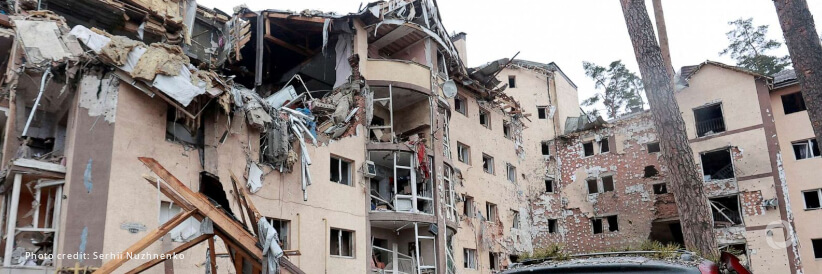The Executive Board of the International Monetary Fund (IMF) approved a 48‑month extended arrangement under the Extended Fund Facility (EFF) with an amount of SDR 11.6 billion (577 percent of quota or about US$15.6 billion). This arrangement is part of a US$115 billion total support package for Ukraine. The Executive Board’s decision allows the immediate disbursement of around SDR 2 billion (or US$2.7 billion).
The overarching goals of the authorities’ program are to sustain economic and financial stability at a time of exceptionally high uncertainty, restore debt sustainability on a forward-looking basis in both a baseline and downside scenario, and promote reforms that support Ukraine’s recovery on the path toward EU accession in the post-war period.
The program, together with financing assurances from the G7, EU, and other donors, is designed to solve Ukraine’s balance of payment problem and restore medium-term external viability. It is in line with the IMF’s policy requirements under the recently modified financing assurances policy (Press Release 23/78) on Upper Credit Tranche-quality financing for countries facing exceptionally high uncertainty, with adequate safeguards for IMF lending.
In view of the exceptionally high uncertainty faced by Ukraine, its IMF-supported program envisions a two-phased approach:
In the first phase of the program, envisaged during 2023-24, the focus will be on (i) implementing a robust budget for 2023 and bolstering revenue mobilization, including by avoiding new measures that might erode tax revenues, (ii) sustaining steady disinflation and exchange rate stability, including through maintaining adequate foreign exchange reserves, and (iii) contributing to long-term financial stability, including by preparing a deeper assessment of the banking sector health and further promoting central bank independence. The authorities are also committed to safeguarding and continuing reforms to strengthen governance and anti-corruption frameworks, including through legislative changes. Social spending will be safeguarded under the program.
The second phase of the program will shift focus to more ambitious structural reforms to entrench macroeconomic stability, support the recovery and early post-war reconstruction, and enhance resilience and higher long-term growth, including in the context of Ukraine’s EU accession goals. Ukraine would be expected to revert to pre-war policy frameworks, principally a flexible exchange rate and inflation targeting, while boosting productivity and competitiveness, strengthening institutions, and tackling financial and energy sector vulnerabilities. In addition, fiscal policies would focus on critical structural reforms to anchor medium-term revenues through the implementation of a national revenue strategy, together with strengthening public finance management and introducing public investment management reforms to support post-war reconstruction.
Following the Executive Board discussion on Ukraine, Ms. Gita Gopinath, First Deputy Managing Director, issued the following statement: “Russia’s invasion of Ukraine continues to have a devastating economic and social impact. Activity contracted sharply last year, a large swathe of the country’s capital stock has been destroyed, and poverty is on the rise. The authorities have nevertheless managed to maintain overall macroeconomic and financial stability, thanks to skillful policymaking and substantial external support. The review of the 4-month Program Monitoring with Board Involvement (PMB) was successfully completed. The authorities met all quantitative and indicative targets and structural benchmarks. This established a strong track record of policymaking despite the challenging circumstances. The 48-month extended arrangement under the Extended Fund Facility (EFF) is built on a two-phased approach, starting with measures to anchor macroeconomic and financial stability as well as to undertake critical structural reforms as the war continues, followed by more ambitious structural reforms to restore medium-term external viability, support sustained growth and post-war reconstruction, and facilitate Ukraine’s path to EU accession”.
Building on the PMB, robust policymaking remains essential. Near-term priorities include (i) implementing a robust budget for 2023, while avoiding new measures that erode tax revenues (ii) supporting steady disinflation and exchange rate stability, including through maintaining adequate FX reserves, (iii) preserving financial sector stability, and (iv) carrying out essential governance and anti-corruption reforms. For the medium term, as conditions permit, the authorities plan to revert to pre-war policy frameworks, principally a flexible exchange rate and inflation targeting, while boosting productivity and competitiveness and strengthening institutions.
Risks to the EFF arrangement are exceptionally high. The success of the program depends on the size, composition, and timing of external financing on concessional terms to help close fiscal and external financing gaps and restore debt sustainability on a forward-looking basis under the baseline and downside scenarios. Moreover, the authorities’ track record of undertaking ambitious policies when warranted, their readiness to undertake contingency measures, and the frequent reviews in the first phase of the program are risk-mitigating factors.
“The program has been appropriately designed to resolve Ukraine’s balance of payments problem and restore medium-term external viability in both a baseline and downside scenario and, thereby, together with other safeguards satisfies the Fund policy requirements on financing assurances for UCT-financing under exceptionally high uncertainty. In conjunction with Ukraine’s capacity and commitment to implement the program as well as the strong engagement of multiple stakeholders, including International Financial Institutions and the private sector, the bulk of Ukraine’s official bilateral creditors and donors has announced, through the statements of the relevant Executive Directors at the Fund, a two-step debt treatment together with the provision of adequate financing assurances on debt relief and concessional financing during and after the program to support debt sustainability both in a baseline and downside scenario”.
A significant group of Fund shareholders reaffirms their recognition of the Fund’s preferred creditor status in respect of the amounts currently outstanding to the Fund by Ukraine, plus any purchases under the extended arrangement. These shareholders comprise the G7 and the following countries: Belgium, Lithuania, the Netherlands, Poland, Slovak Republic, and Spain. They further undertake to provide adequate financial support to secure Ukraine’s ability to service all of its obligations to the Fund, in accordance with the Fund’s preferred creditor status and complementing the Fund’s multilayered risk management framework.
See also: 🔴 LIVE UPDATES | Humanitarian response to Ukraine crisis

